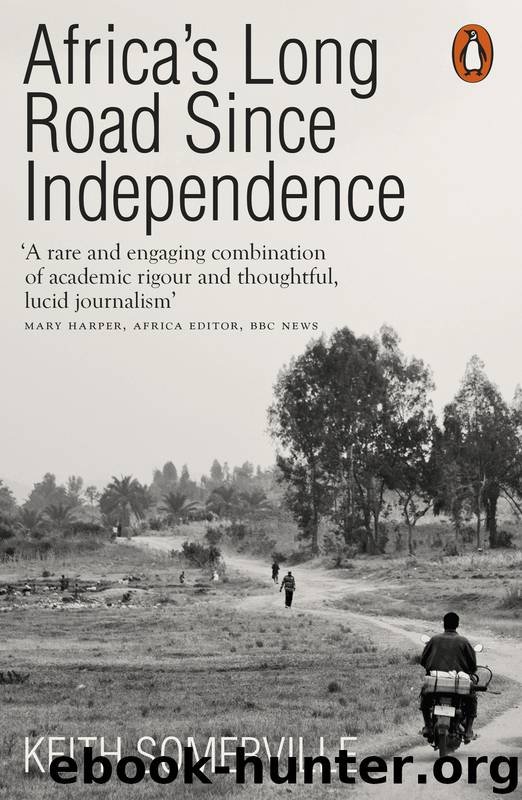Africa's Long Road Since Independence by Keith Somerville

Author:Keith Somerville
Language: eng
Format: epub
ISBN: 9780141984100
Publisher: Penguin Books Ltd
Published: 2016-11-22T05:00:00+00:00
Rwanda and the Congo: Civil war, genocide and descent into regional war in the Great Lakes
The genocide in Rwanda had its origins in the way that the complex and centuries-old political and economic relationships between the state’s Tutsi and Hutu populations had been distorted, first by colonisation and then by the Hutu revolution that preceded independence. After independence, the Hutu supremacist Kayibanda government’s rule benefited relatively few Rwandans, even among the majority Hutu community. Kayibanda’s ideology was based on the Hutu supremacy set out in the 1957 Bahutu Manifesto: his government concentrated power and distributed patronage among those from his own regional power base in southern Rwanda, and excluded northern Hutu. Under Kayibanda, Tutsi were excluded from politics and deprived of access to education. They were labelled as outsiders who had subjugated the Hutu majority by force, and who must now be permanently excluded from power.21 Hutu fear of the Tutsi was entrenched though the use of racist ideology, and given impetus in 1963 when Tutsi guerrillas based in Uganda and eastern Congo mounted raids into northern Rwanda.
Tutsis forced into exile had established insurgent groups; they received some support from neighbouring states such as Uganda or Burundi, or operated in border areas of Zaire where the government had little or no control. In December 1963, a Tutsi insurgent raid on the Bugesera region of Rwanda resulted in a government-encouraged pogrom, and in the weeks that followed, ‘Rwanda lived through an unprecedented orgy of violence of murder targeted against Tutsi’; the final death toll was estimated at between 10,000 and 14,000.22 Tens of thousands more Tutsis fled Rwanda, many of them joining the guerrillas in Uganda. The government labelled the insurgents inyenzi, the Kinyarwanda word for cockroaches, and that term was used to make fear and dehumanisation of the Tutsi a part of everyday political discourse.
This ethnic scapegoating did not protect Kayibanda from the discontent caused by economic decline, which arose from Rwanda’s dependence on fluctuating revenues from coffee and tin. On 5 July 1973, he was overthrown in a coup led by the army chief, Juvenal Habyarimana. The coup enshrined the dominance of Hutu groups from the previously marginalised communities in the north and north-west.23 While Habyarimana was a northerner, he was not from the strongly anti-Tutsi clans of the north-west. By October 1990, when the Tutsi-led Rwandan Patriotic Front (RPF) invaded northern Rwanda from Uganda, Hutu from the north and north-west held a near monopoly of senior positions within the government, the army and the economy.24 After taking power, Habyarimana had moved to soften the racially-based ideology of Hutu; this didn’t mean the Tutsi gained equality, but they were now viewed as a Rwandan ethnic group rather than as racially different outsiders. This was intended to reduce tensions and outbreaks of violence by ending concerted persecution. The Tutsi were still excluded from higher positions in local and central government, the civil service and the army, but they had better access to education and more freedom to engage in commerce.
Habyarimana
Download
This site does not store any files on its server. We only index and link to content provided by other sites. Please contact the content providers to delete copyright contents if any and email us, we'll remove relevant links or contents immediately.
| Africa | Americas |
| Arctic & Antarctica | Asia |
| Australia & Oceania | Europe |
| Middle East | Russia |
| United States | World |
| Ancient Civilizations | Military |
| Historical Study & Educational Resources |
Goodbye Paradise(3810)
Men at Arms by Terry Pratchett(2838)
Tobruk by Peter Fitzsimons(2518)
Borders by unknow(2315)
Arabs by Eugene Rogan(2299)
Pirate Alley by Terry McKnight(2221)
More Than Words (Sweet Lady Kisses) by Helen West(1867)
Belonging by Unknown(1859)
It's Our Turn to Eat by Michela Wrong(1731)
The Biafra Story by Frederick Forsyth(1656)
The Source by James A. Michener(1615)
Botswana--Culture Smart! by Michael Main(1602)
Coffee: From Bean to Barista by Robert W. Thurston(1547)
A Winter in Arabia by Freya Stark(1538)
Gandhi by Ramachandra Guha(1534)
The Falls by Unknown(1527)
Livingstone by Tim Jeal(1489)
The Shield and The Sword by Ernle Bradford(1409)
Africa: Altered States, Ordinary Miracles by Richard Dowden(1385)
